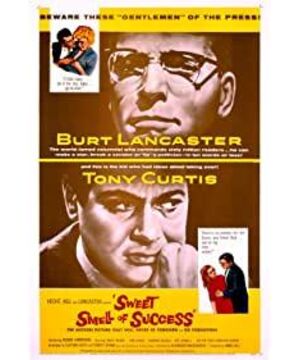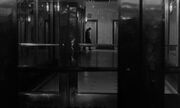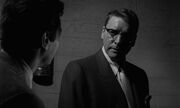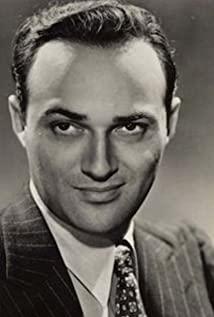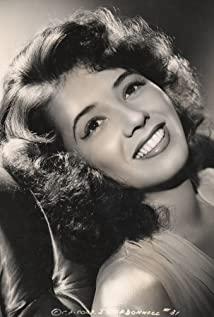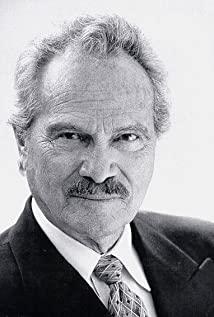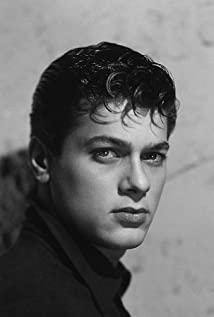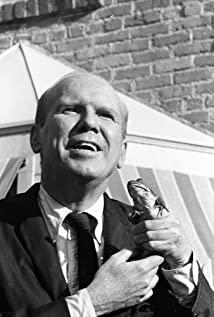In 1954, the British Broadcasting Corporation acquiredAt the studio, director Alexander McKendrick , who was at risk of potential unemployment , began taking on Hollywood entertainment. He turned down big names like Cary Grant and David O. Selznick as independent production company Hill-Hecht-Lancaster lured him with an adaptation of George Bernard Shaw 's play The Devil's Disciple . As a result, the project failed and was cancelled during pre-production, so the director hoped to terminate the contract. Harold Hecht turned down his request, hoping that McKendrick would start taking on another project, adapting Ernst Lehrmann's novel "Sweet Smell of Success" into a film.
Lechman's story was originally published in 1950's " Fashion " magazine, but was renamed "Tell Me What Tomorrow!" ". This story is based on the author 's own experience as an assistant to The Hollywood Reporter columnist Irving Hoffman. Hoffman year and a half did not do this and Lehmann said after the words, and then he speculated in the column, Lehmann can become an outstanding playwright , which is less than a week after Paramount Pictures, Inc. hit Call Lechman and ask him to go to Los Angeles to talk. After being invited, Lehrman began a prominent screenwriting career in Hollywood, creating several successful works such as " Across the World", " Sabrina ", " North by Northwest " and "The King and I".
By the time Hill-Hecht-Lancaster acquired the film rights to "Sweet Smell of Success," Lehrman's position was not only the screenwriter of his own novel, but also the director and producer of the film. After picking locations, Hecht told Lechman that United Arts, which was in charge of the film's distribution, was skeptical of a novice director, so Hecht handed the job over to McKendrick. The latter initially had reservations about making a script with so much dialogue that he and Lehrman began rewriting it for weeks to make it more suitable for a movie. By the time the script was nearing completion, Lechman fell ill and had to withdraw from the production of the film. James Hill took over and asked Paddy Chayevsky to continue Lechman's work, while McKendrick suggested bringing in Clifford Ordes, the playwright who has a reputation as a hero of the left, has been controversial for testifying before the House Un-American Activities Committee .
McKendrick had expected Odes to take two to three weeks to polish the script, but it took him four months. The director recalled, "We started shooting without the final script, and Clifford rebuilt (the entire script) from start to finish". Most of the plot remains the same, but in McKendrick's autobiography, "What Clifford does is actually dismantle the structure of any episode, and then rebuilds the situation and the relationships in it all in a more complex way. , with greater tension and more violent energy". The process took time, and the start date couldn’t be delayed, so Odes had to travel with the crew to Manhattan so that he could continue rewriting the script while the film was being shot, much of which was shot the day he wrote it. The director said that due to the lack of time, Clifford had no way to completely delete the lines in the script, so the crew, including the actors, would discuss this issue together.
Bernard Schwartz had a contract with Universal at the time, the company worried that his role as Sidney Falco would ruin his career, and Curtis was tired of playing the handsome guy and wanted to prove his acting skills, So decided to continue. Orson Welles was initially considered for the casting of J.J. Hansek , and McKendrick was planning to cast Hume Cronyn because the actor was more like Walter Winchell, who is Hansek in the novel. A corner prototype. Lehrman said in an interview that Witchell was the inspiration for his character in the novel, but it was different from the character in the film. United Artists wanted Burt Lancaster to play Hansek because of his previous box office hits and a successful collaboration with Curtis on Trapeze. Robert Vaughn, who is under contract with Lancaster's studio, was supposed to play Steve Dallas, but was drafted into the army before filming began.
Hill-Hecht-Lancaster agreed to let the director familiarize himself with New York City before filming. In Notes on Sweet Smell of Success, McKendrick stated, "One of the characteristics of New York City, especially from 42nd Street to 57th Street, is the jittery energy on the crowded side walk or foot way . I I think this is the most basic driving force of the characters in the story, it's ugly wild ambition; careerism and greed; avarice ." He took multiple city Photographs from multiple fixed locations and recorded them as panoramas, and once returned to Hollywood, Nail to the wall for research.
Cello player Fred Katz and drummer Chico Hamilton briefly appeared in the film as their real identities, and the two composed a piece of music for the film, but in the end did not adopt it, instead using Elmer Bernstein 's soundtrack.
McKendrick began filming in late 1956, and was always apprehensive along the way, as Hill Hecht-Lancaster has a reputation for firing directors for trivial or even no reason. The director will do a lot of rehearsal before shooting a shot, and because the script can't keep up, he often shoots these pages only one to two hours after the screenwriter has written a few pages. Lancaster's presence also made McKendrick nervous, as he was both star and producer, and a frustrated director with a reputation for demanding others. McKendrick was equally anxious to shoot on location in New York City, where the location was shot in the busiest, busiest area, with the occasional young Bernard Schwartz fan crossing police barriers that interfered with the filming. The director recalled, "We shot at Times Square during the rush hour, we had efficient actors and a camera crane, police help and so on, but we just didn't have a script. We knew we were Moving forward blindfolded, but that's all."


